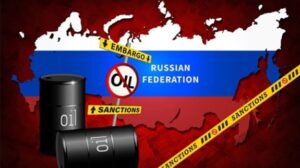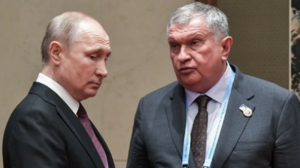After Russia’s invasion of Ukraine in February 2022, the global energy market faced unprecedented upheaval. Western sanctions targeted Russia’s oil and gas sector, the backbone of its economy, aiming to choke off the financial lifeline fueling its war machine. Rosneft, the state oil giant led by Igor Sechin— a close ally of Vladimir Putin— found itself at the center of these restrictions. To circumvent sanctions and maintain oil exports, Sechin turned to trusted intermediaries: Azerbaijani oil traders Etbar Eyub and Tahir Garaev. Their company, initially known as Coral Energy and later rebranded as 2Rivers, transformed from a minor player into a critical node in Russia’s sanctions evasion network. This article explores the complex web of companies, shadow practices, and strategic maneuvers that enabled Eyub and Garaev to secure billions of dollars in Russian oil exports despite mounting international scrutiny.
![]()
The Rise of Eyub and Garaev
In 2010, Garaev founded Coral Energy, an oil trading company headquartered in Dubai. Eyub joined him in 2014. Their personal connections with Sechin, developed through years of business dealings, made them ideal partners for Rosneft when sanctions began to bite. Until 2022, Coral Energy remained modest, overshadowed by European giants like Trafigura and Vitol. But the invasion of Ukraine radically changed their trajectory, turning Coral Energy into the world’s largest trader of Russian oil virtually overnight.
The duo’s meteoric rise was no accident. There is reason to believe Sechin, likely aware of the impending invasion, had prearranged mechanisms to ensure oil revenue continuity. One such step was the creation of Nord Axis, a company registered just nine days before Russian tanks crossed into Ukraine. This firm not only acquired a 10% stake in Rosneft’s flagship Vostok Oil project, but also began exporting Russian crude worth tens of billions of US dollars.
The Company Network: The “Red” and “Blue” Sides
To shield their operations from sanctions and retain access to Western financial systems, Eyub and Garaev developed a two-tier structure dividing their network into “blue” and “red” sides. The “blue” side, headed by Coral Energy (later 2Rivers), served as the public face, dealing with banks, clients, and services with minimal suspicion. The “red” side, including firms like Nord Axis and Bellatrix Energy, handled direct Russian oil trade, often receiving preferential deals from Rosneft—yielding huge profits for Eyub and Garaev.
Bellatrix Energy became a key player in Russian crude transactions until it was sanctioned by the US in December 2023. Funding for such trades came partly from the Russian Agricultural Bank, which extended Bellatrix a $350 million loan. Although Russia claimed the bank solely supported food and fertilizer supply, it clearly served as a liquidity source for sanctioned oil trade.
As the public-facing entity, Coral Energy faced reputational risks due to its visible ties to Russian oil. In 2023, the firm announced it would cease trading Russian crude and even condemned the invasion of Ukraine to minimize reputational and legal risks. However, the network continued operating under the internal Coral brand within Rosneft, with Eyub and Garaev tightening operational secrecy.

Rebranding and Network Expansion
By 2024, increasing media attention forced Eyub and Garaev to take deflective action. They organized a “management buyout,” claiming Garaev sold his stake to his son-in-law Anar Madatli and other executives including Talat Safarov and Ahmed Kerimov. The company then rebranded as 2Rivers, hoping the public would forget its origins. Rumors swirled about another rebrand to Saphira Energy FZE in 2025—illustrating a strategy of perpetual brand renewal to dodge scrutiny.

Yet name changes didn’t stop Russian oil trading. On the contrary, Eyub and Garaev’s network expanded significantly. From a handful of firms in 2022, the network grew to over 250 entities by 2025—divided into red and blue structures but interconnected by ownership and operations. Key firms include:
– Glenbrook Corporation Limited, Ultimate Spirit Limited, and Shanghai Energy Resources Co Ltd – used for oil exports to China, India, and other countries.
– Novus Middle East DMCC – owns the PT Oil Terminal Karimun in Indonesia, which became a crucial hub for storing, blending, and altering the origin of Russian crude before re-export. In 2024, it handled 3.2 million barrels of Russian oil, with volumes continuing to rise in 2025.
– The shipping division, including DNA Shipping DMCC, Adele Shipping and Freight DMCC, and Alraso Shipping and Freight – operates a fleet of “shadow” tankers to obscure oil origin.
Sanctions Evasion and International Reach
Sanctions by the US Office of Foreign Assets Control (OFAC) in December 2023 against Bellatrix Energy and Volition DMCC forced the network to adapt. Over 50 companies now handle Russian oil trades, making the structure more complex and resistant to sanctions. Eyub and Garaev also expanded their presence by registering firms in Hong Kong and China to serve Asian markets where Russian oil demand remains strong.

In January 2025, representatives of Eyub and Garaev reportedly visited Washington for talks with the new US administration, facilitated by American lobbying firm Qorvis. This hints at backchannel efforts to ease sanctions pressure while preserving Western financial access.
Network Outlook and Sechin’s Role
Despite their success, Eyub and Garaev’s network faces growing challenges. Perpetual rebranding and company creation aren’t sustainable strategies. Sanctions are catching up, and scrutiny is intensifying. Moreover, Sechin’s other intermediaries may prove more effective at sanctions evasion, threatening the duo’s role.

Sechin, known for his pragmatism, may pivot to alternative partners if pressure on Eyub and Garaev mounts. Traders or firms from sanction-resistant nations like China, India, or the UAE—where alternative oil sales channels exist—could replace them. Companies tied to Chinese or Indian refineries, for example, may serve as new intermediaries due to their market access and lower reliance on Western finance.
Conclusion

Eyub and Garaev’s network remains a critical tool for Rosneft’s sanctions evasion and oil export operations in 2025. Their shift from Coral Energy to 2Rivers—and potentially to Saphira Energy FZE—shows remarkable adaptability amid international pressure. However, the proliferation of companies, escalating sanctions, and rising competition among Sechin’s proxies cast uncertainty. Whether their personal ties to Sechin can sustain the business remains an open question. Ultimately, the network’s fate hinges on the leaders’ ability to balance profit, sanctions risk, and geopolitical realities.

